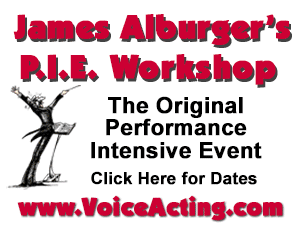|
TECHNOLOGY Are You Prepared For Disaster? Think 'What If' And Have A Plan  By Mike Harrison By Mike HarrisonVoice Actor You know - or at least have heard - of the importance of backing up your important files. But that’s not what this article is about. Neither is it about keeping your voice healthy. This is about being able to deliver what you promise, consistently and without interruption. If being a voice over talent is what you rely on for the majority of your income, it cannot be treated as if it were a hobby. And a big part of being a professional is consistency:
I came to voice over from (surprise!) radio, where I was not only on the air but, also, as Production Director, I was responsible for the creation of commercials. Additionally, I would occasionally be pressed into service by the Chief and/or Assistant Chief Engineer when they needed help installing or repairing equipment. I know my way around a studio, how it functions, why it functions, and what to do when a part of it fails to function. Because of my broadcast background … well, OK, and also because I’m a geek, I’ll share this story. RADIO'S REINVENTION Radio broadcasting had been around for only about 25 years or so and had enjoyed tremendous success before television came along and forced radio to change - or it would not have survived. (NBC’s Rockefeller Center studios, including 8H, home of Saturday Night Live, began life as radio studios.) When the entertainers who had become famous on radio decided it would be better for their careers if they could be seen and heard by audiences rather than just heard, they jumped ship and went to TV, leaving radio to reinvent itself. It took some time, but radio then reemerged as predominantly a source for music and information. WABC: CONSISTENT POWERHOUSE One such radio station was New York’s WABC. With a signal that allowed it to be heard sometimes as far away as Hawaii, the station had great potential. And this was not long after the birth of rock and roll. The station’s Program Director (the late, great Rick Sklar) realized the marketplace was changing in a big way: millions of Baby Boomer children were coming of age and needed a station to hear the music that was now being made for (and, in some cases, by) them, and this created a whole new market for advertisers. He knew that if his radio station was to be a success, it had to be not only a powerhouse, but a consistent powerhouse. We were, at the time, entering the ‘Space Age ’ - we had just begun putting men into orbit and would later go to the moon. This required a level of geekdom we hadn’t known before. But NASA was able to provide it reliably and consistently. THE BACKUP PLAN Sklar visited NASA one day and, when he returned to New York, he put what he’d learned into practice. A complete duplicate of WABC’s on-air studio was built and was on constant standby. In each studio, there were two copies of every song, commercial, promo and jingle. Nothing was left to chance. If something - anything - caused the music to stop playing for more than a just a few seconds, whatever backup was required to correct the situation was immediately put into play. Millions of people were listening, and an outage would cause the listeners (aka potential customers of the advertisers) to tune to another station. Lost revenue. APPLY TO VOICE OVER Fast forward. My mic preamp, obviously a necessary part of my studio, went down a couple of weeks ago. Without it, my microphone - regardless of how expensive or how well-regarded in the industry - was useless. There can be plenty of water in the reservoir, but if there’s no means of getting it into your home, it does you no good. I own a couple of other devices containing mic preamps, so there was no downtime. But what if I didn’t own those other devices? One doesn’t have a mic preamp fixed within a couple of hours at the local mall. THINK: WHAT IF? Obviously, other issues can cause problems. For instance:
Being able to quickly adapt to changing conditions is a great asset in any situation, but especially business. END OF STORY ... So, a final WABC story. Their studios in Manhattan were linked to their transmitter in Lodi, NJ primarily by microwave, with a backup in the form of dedicated telephone lines; a primary and a secondary. One day, as construction on a new building across the street from the studio continued, workers hoisted a new girder into position, interrupting the microwave beam and knocking WABC off the air. Engineers scrambled; first switching the audio feed to the primary phone line, only to discover the telephone company was doing construction of their own, and the line was not working. The secondary line? It traveled in the same underground conduit and was also not available. Now off the air for several minutes, one of the engineers ingeniously decided to try the untested: they aimed the microwave dish in a slightly different direction and bounced the signal off of another building, sending it around the construction site and reestablished the connection with the transmitter. Don’t wait for disaster before considering options. Always plan for ‘what if…’ --------------------- ABOUT MIKE Since 1973, Mike Harrison has been engaged professionally in several fields (radio, corporate communications multimedia production, advertising) where work was performed in either acoustically-treated rooms with microphones and/or semi-darkened rooms filled with expensive equipment featuring pretty, often-blinking multi-colored lights and various knobs, switches and buttons, and whose innate skill with said equipment, particularly the fluency and speed with which he operates it, has been aptly described by the words, "wip, bom, bip, bom, boop.” He also writes pretty darned good copy. Web: http://mike-harrison.com |
Tell Us What YOU Think!
Please Note: Since we check for spam, there will be a slight delay in the actual posting of your comment.
Comments (1)
Elizabeth Holmes
5/27/2013 at 12:31 PM
Mike -- Yes, you DO write pretty darned good copy! Thank you for this timely reminder that "Stuff Happens," and it's easier to be prepared than scramble to fix preventable emergencies. Thank you also for the fascinating details about WABC's history. (Who can resist cautionary tale with a happy ending?)










click for new article alerts